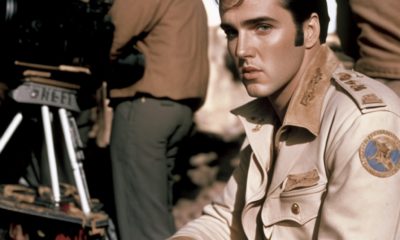Life
How to Be Okay With Making Mistakes and Why They’re So Important

I ran my first workshop to two friends in their living room. It was pretty bad. I apologized throughout: “I’m sorry this is so bad!” My hands shook, and I fumbled my words. But a year later, when I’d run a series of successful workshops, I was glad I decided to do that first workshop from my friend’s couch. I was grateful I’d taken the risk, and given it a go because I pushed through the awkward stage in order to get to the good part.
I had similar learning experience while testing my accountability program. I didn’t get a response from one of my testers, so I assumed she had left the program. I thought nothing of it, but then received a message from her: “I thought the program was good. But when I didn’t send in my weekly report and you didn’t check in with me or follow up… I gave up.”
I was mortified. My accountability program was designed to support people each week and I had neglected to do the one thing I promised to do! But here’s what I learned: mistakes are part of it. Mistakes are a rite of passage for anything worthwhile. We have to learn for ourselves what works as it’s an important part of the journey.
Know that you will trip up and make mistakes but it is up to you if you get back up again. There is no “mistake-free” route. Life is about taking action, learning, and re-plotting.
So for anyone starting a new business or something similar, here are four things to keep in mind:
1. Don’t be afraid to let mistakes happen
Let them happen, they will crop up. There is no perfect route! We can’t learn without stumbling (a little). I see the following taglines in many business start-up webinars: “Let me share my mistakes, so you don’t make any!” It’s great to learn from people who are further ahead, but we need to make mistakes.
We have to go through our own learning, to discover what works for us. So learn from the experts or the people who are further ahead but don’t mistake this for “never doing anything wrong”.
If you’re starting something exciting, and hoping to never make a mistake, you’ll have a shock when the inevitable occurs. Instead, be open to it. What mistakes will I make? What will I learn from them? How can I grow from them?
2. Appreciate the risk you’re taking
Not everyone pursues their goal or dream. Not everyone risks new experiences. Whether it’s a new hobby or attending an event on your own, know that there are people who won’t put themselves through it. They’re too scared, and they will make excuses.
My point is to acknowledge the risk you’re taking with your new venture. The courage and strength it takes to push yourself, and keep going is tough so give yourself credit. Know that for every mistake you make, there are ten people out there who don’t have the guts to do what you’re doing. Give yourself a pat on the back. Forget about “winning” and focus on doing.
“Don’t think, just do.” – Horace
3. Know that everyone goes through making mistakes
Every single person who created something amazing (a wonderful relationship; a close and loving family; a thriving business) made mistakes along the way. They messed up, they did things wrong and they allowed themselves to learn in order to come out stronger.
Think about anyone you admire: Beyonce; a New York symphony orchestra player; an Olympic snowboarder… do you think they made mistakes along the way? Did they fall down, and get back up again? Of course they did.
Because everything worthwhile involves risk. The people you see at the top of their game have all made mistakes. So take a page from their book and make mistakes now. Make them quickly, improve, and move on. You’ll soon be someone other people are asking how you got to be where you are now.
4. Ignore the judgers
There will always be people who look at what you do, without knowing much (if anything) about your situation, and comment or pass judgment. The funny thing is that most of them do it from the sidelines; they don’t get involved in the game themselves.
In my twenties, I changed jobs a lot. I wasn’t sure what I wanted to do, so I tested different careers. This experience was vital to learn what worked for me. I grew from it, and it set me on the path I’m on today.
During this time, my great-aunt commented on my job-hopping. She was concerned about it, and shared that with me many times. And yet, she hadn’t worked outside of the home for 40 years.
“My mom always said that there would be haters. Not everyone can love ya.” – Joel Madden
You might wonder how someone can make groundless comments like that but people do. Childless friends who comment on your parenting style. Family members who question your decision to travel the world, when they don’t own a passport. Colleagues who tell you your business venture won’t work, when they don’t have the courage to leave the company they work for.
So what should we do? Ignore them. Let them do their thing, and you do yours, because anyone can criticize. It’s infinitely more difficult to build and accomplish. The question is: what do you want to accomplish and are you willing to risk making mistakes to get there?
What type of business do you want to build? Let us know below!
Image courtesy of Twenty20.com
Did You Know
How Skilled Migrants Are Building Successful Careers After Moving Countries
Behind every successful skilled migrant career is a mix of resilience, strategy, and navigating systems built for locals.

Moving to a new country for work is exciting, but it can also be unnerving. Skilled migrants leave behind familiar systems, networks, and support to pursue better job opportunities and a better future for their families. (more…)
Life
10 Research-Backed Steps to Create Real Change This New Year
This New Year could finally be the one where you break old patterns and create real, lasting change.

Every New Year, we make plans and set goals, but often repeat old patterns. (more…)
Life
9 Harsh Truths Every Young Man Must Face to Succeed in the Modern World
Before chasing success, every young man needs to face these 9 brutal realities shaping masculinity in the modern world.

Many young men today quietly battle depression, loneliness, and a sense of confusion about who they’re meant to be.
Some blame the lack of deep friendships or romantic relationships. Others feel lost in a digital world that often labels traditional masculinity as “toxic.”
But the truth is this: becoming a man in the modern age takes more than just surviving. It takes resilience, direction, and a willingness to grow even when no one’s watching.
Success doesn’t arrive by accident or luck. It’s built on discipline, sacrifice, and consistency.
Here are 9 harsh truths every young man should know if he wants to thrive, not just survive, in the digital age.
1. Never Use Your Illness as an Excuse
As Dr. Jordan B. Peterson often says, successful people don’t complain; they act.
Your illness, hardship, or struggle shouldn’t define your limits; it should define your motivation. Rest when you must, but always get back up and keep building your dreams. Motivation doesn’t appear magically. It comes after you take action.
Here are five key lessons I’ve learned from Dr. Peterson:
-
Learn to write clearly; clarity of thought makes you dangerous.
-
Read quality literature in your free time.
-
Nurture a strong relationship with your family.
-
Share your ideas publicly; your voice matters.
-
Become a “monster”, powerful, but disciplined enough to control it.
The best leaders and thinkers are grounded. They welcome criticism, adapt quickly, and keep moving forward no matter what.
2. You Can’t Please Everyone And That’s Okay
You don’t need a crowd of people to feel fulfilled. You need a few friends who genuinely accept you for who you are.
If your circle doesn’t bring out your best, it’s okay to walk away. Solitude can be a powerful teacher. It gives you space to understand what you truly want from life. Remember, successful men aren’t people-pleasers; they’re purpose-driven.
3. You Can Control the Process, Not the Outcome
Especially in creative work, writing, business, or content creation, you control effort, not results.
You might publish two articles a day, but you can’t dictate which one will go viral. Focus on mastery, not metrics. Many great writers toiled for years in obscurity before anyone noticed them. Rejection, criticism, and indifference are all part of the path.
The best creators focus on storytelling, not applause.
4. Rejection Is Never Personal
Rejection doesn’t mean you’re unworthy. It simply means your offer, idea, or timing didn’t align.
Every successful person has faced rejection repeatedly. What separates them is persistence and perspective. They see rejection as feedback, not failure. The faster you learn that truth, the faster you’ll grow.
5. Women Value Comfort and Security
Understanding women requires maturity and empathy.
Through books, lectures, and personal growth, I’ve learned that most women desire a man who is grounded, intelligent, confident, emotionally stable, and consistent. Some want humor, others intellect, but nearly all want to feel safe and supported.
Instead of chasing attention, work on self-improvement. Build competence and confidence, and the rest will follow naturally.
6. There’s No Such Thing as Failure, Only Lessons
A powerful lesson from Neuro-Linguistic Programming: failure only exists when you stop trying.
Every mistake brings data. Every setback builds wisdom. The most successful men aren’t fearless. They’ve simply learned to act despite fear.
Be proud of your scars. They’re proof you were brave enough to try.
7. Public Speaking Is an Art Form
Public speaking is one of the most valuable and underrated skills a man can master.
It’s not about perfection; it’s about connection. The best speakers tell stories, inspire confidence, and make people feel seen. They research deeply, speak honestly, and practice relentlessly.
If you can speak well, you can lead, sell, teach, and inspire. Start small, practice at work, in class, or even in front of a mirror, and watch your confidence skyrocket.
8. Teaching Is Leadership in Disguise
Great teachers are not just knowledgeable. They’re brave, compassionate, and disciplined.
Teaching forces you to articulate what you know, and in doing so, you master it at a deeper level. Whether you’re mentoring a peer, leading a team, or sharing insights online, teaching refines your purpose.
Lifelong learners become lifelong leaders.
9. Study Human Nature to Achieve Your Dreams
One of the toughest lessons to accept: most people are self-interested.
That’s not cynicism, it’s human nature. Understanding this helps you navigate relationships, business, and communication more effectively.
Everyone has a darker side, but successful people learn to channel theirs productively into discipline, creativity, and drive.
Psychology isn’t just theory; it’s a toolkit. Learn how people think, act, and decide, and you’ll know how to lead them, influence them, and even understand yourself better.
Final Thoughts
The digital age offers endless opportunities, but only to those who are willing to take responsibility, confront discomfort, and keep improving.
Becoming a man today means embracing the hard truths most avoid.
Because at the end of the day, success isn’t about luck. It’s about who you become when life tests you the most.
Change Your Mindset
The Four Types of Happiness: Which One Are You Living In?
Most people chase success only to find emptiness, this model reveals why true happiness lies somewhere else.

In a world driven by rapid technological growth and constant competition, many people unknowingly trade joy for achievement. (more…)
-

 News2 weeks ago
News2 weeks agoBrandon Willington Builds 7-Figure Business by Ignoring Almost Everything
-

 Health & Fitness2 weeks ago
Health & Fitness2 weeks agoWhat Minimalism Actually Means for Your Wellness Choices
-

 Did You Know2 weeks ago
Did You Know2 weeks agoWhy Most Online Courses Fail and How to Fix Them
-

 Business2 weeks ago
Business2 weeks agoIf Your Business Internet Keeps Letting You Down, Read This
-

 Business4 days ago
Business4 days agoEntrepreneur’s Guide to Pay Stubs: Why Freelancers and Small Business Owners Need a Smart Generator
-

 Business2 days ago
Business2 days agoThe Simple Security Stack Every Online Business Needs
-

 Finances2 days ago
Finances2 days agoWhy Financial Stress Is One of the Biggest Barriers to Personal Growth
-

 Scale Your Business2 days ago
Scale Your Business2 days ago5 Real Ways to Grow Your User Base Fast

























2 Comments